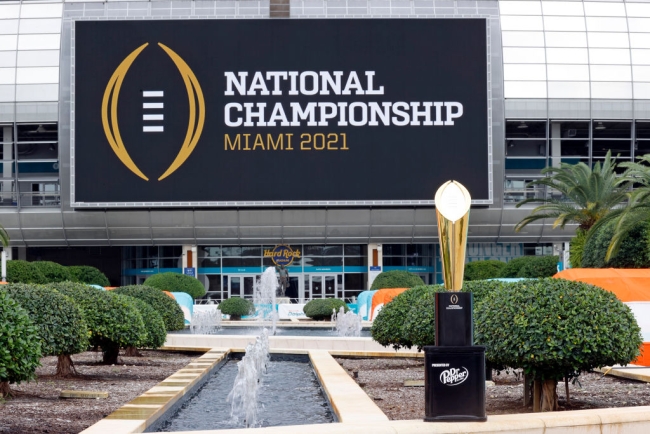You have /5 articles left.
Sign up for a free account or log in.

Joel Auerbach/Contributor via Getty Images
The Knight Commission on Intercollegiate Athletics issued recommendations to overhaul management of the nation’s top college football programs, suggesting that a new entity be created to oversee the Football Bowl Subdivision, which includes the most successful and lucrative teams in the sport.
The commission, which advocates for college sports reform and an academic-focused model, completed a yearlong review on Thursday of the current competition and revenue structure for 130 institutions in the FBS, a college football subdivision within Division I of the National Collegiate Athletic Association. The commission published a wide-ranging report on the history of FBS governance and issues that commission members, including current and former college presidents, athletic directors, and former college athletes, believe have led to inequities among FBS institutions and a lack of accountability for how revenue from college football championship and playoff games is allocated.
The proposal aims to centralize FBS governance, downsizing from two controlling entities to one, and give athletic conferences and colleges that compete in the subdivision equal input in decision making, regardless of the winning record or profitability of their football programs. The new model would allow the NCAA to dedicate its resources to the sports for which it oversees championships -- all those other than FBS football -- and the sports from which it gains revenue, such as men's basketball, according to the commission.
During a virtual meeting Thursday, Nancy Zimpher, chancellor emeritus of the State University of New York and a Knight Commission member, outlined the commission’s three major recommendations:
- Institutional leaders should create a new entity to oversee FBS operations, called the National College Football Association. The new entity would be separate from the NCAA and from the group that currently manages college football playoff and championship games, the College Football Playoff.
- The NCAA should govern all other sports that are not FBS football, including the other subdivisions of football, and create a voting system within association leadership that is equal for all athletic conferences. Currently, institutions with FBS football have more voting power on the NCAA Division I Board of Directors than non-FBS institutions. Other aspects of NCAA structure, such as the Division I men’s basketball championship and tournament structure, should remain the same, Zimpher said. The tournament is the NCAA’s primary revenue stream.
- The NCAA and the proposed NCFA should adopt a set of principles that include recognizing college athletes as “students first,” allowing athletes to profit from their personal celebrity and committing to using revenue to “advance educational missions and educational opportunities for athletes.”
“We recognize that change of this magnitude will not be easy. But we believe it is urgently needed,” Zimpher said during the meeting. “No single entity is responsible for the most powerful sport in college athletics, FBS football. It is time to change this.”
The commission’s proposal to create a new entity would be a significant departure from the current structure for FBS playoff and championship games. This competition, known as the College Football Playoff, or CFP, has been operated by the CFP Administration LLC, a company that is separate from the NCAA, since 2015, according to the commission’s report.
The CFP distributed about $462 million to institutions that competed in football playoff competition in 2019, according to Knight Commission research. The commission found that nearly 80 percent of this revenue went to institutions in the “Power Five” conferences, which include the Big Ten Conference and the Southeastern Conference, and major football colleges such as Clemson University, Louisiana State University and Ohio State University, all of which tend to be the most successful and richest among college football competitors. The Power Five conferences also have more voting power in NCAA Division I governance.
Revenue from CFP “may be used at the discretion of the institution without regard to education, health, safety, and success of football players,” whereas other college sports with NCAA championship competition must abide by association rules that require some revenue to be used for educational purposes, the commission’s report said. FBS football programs do still receive annual funding from the NCAA that contributes to football scholarships, the report said. The NCAA provides oversight such as rules enforcement, insurance and legal and health and safety-related services to FBS football during the regular season, despite not receiving any revenue from the CFP, the report said.
The commission report outlined potential benefits to the NCAA if the new structure is adopted, including that it will no longer have to dedicate staffing and financial resources to oversee FBS football and can focus on other sports, for which it oversees their playoffs and championships. The NCAA is facing significant budget challenges due to the coronavirus pandemic and the cancellation of the 2020 men’s basketball tournament and will furlough 600 employees this year.
The association is currently "discussing the long-term sustainability of intercollegiate athletics," an NCAA press release responding to the commission report said. The statement noted that college sports governance is determined by college presidents and chancellors.
"The nearly 1,100 presidents of NCAA schools have consistently sought to create the most effective and fair ways to support student athletes," the statement said. "Discussions are focused on promoting the education, health and safety and fair treatment of college athletes. NCAA members within Division I have long sought to include a diverse representation of schools while supporting all student-athletes in similar ways."
As for the CFP, the commission’s proposal would essentially take the place of the company that currently operates it. The college football championship structure, media rights and other operations are managed by staff members within the CFP Administration LLC, and governed by the CFP Board of Managers, a group of 11 university presidents and chancellors, according to the CFP website. One Board of Managers member is Eric Barron, president of Pennsylvania State University, who signed on to the Knight Commission’s proposal for the FBS overhaul. Other college leaders hold both commission membership and leadership within a college athletic conference, such as Michael Crow, president of Arizona State University, who is part of the leadership group for the Pac-12 Conference.
Bill Hancock, executive director of the CFP, declined to comment on the commission’s recommendations.
"Our priority now is preparing for this year’s national championship," he said in an emailed statement.
In order for the plan for the new entity to oversee the FBS to come to fruition, it will need approval from college leaders within the NCAA. As an advocacy organization, the Knight Commission has pushed for major college sports reform for several years but has struggled to actually prompt significant change.
The changes could also lead to a “realignment of conference memberships” and “establishment of new Division I multi-sport conferences,” the commission’s report said. Such an overhaul “will not take place overnight,” but leaders should begin discussion “immediately,” the report said.
“Even prior to the COVID-19 pandemic, many Division I athletic programs were hemorrhaging money, raising student fees to inappropriate levels, spending beyond their means on coaching salaries and gilded facilities to keep up with FBS competitors, while shortchanging or even dropping Olympic sports,” the report said. “In this moment of both crisis and opportunity, university leaders should follow through on their desire for ‘big solutions’ to benefit college athletes and preserve intercollegiate athletics as a public trust.”




